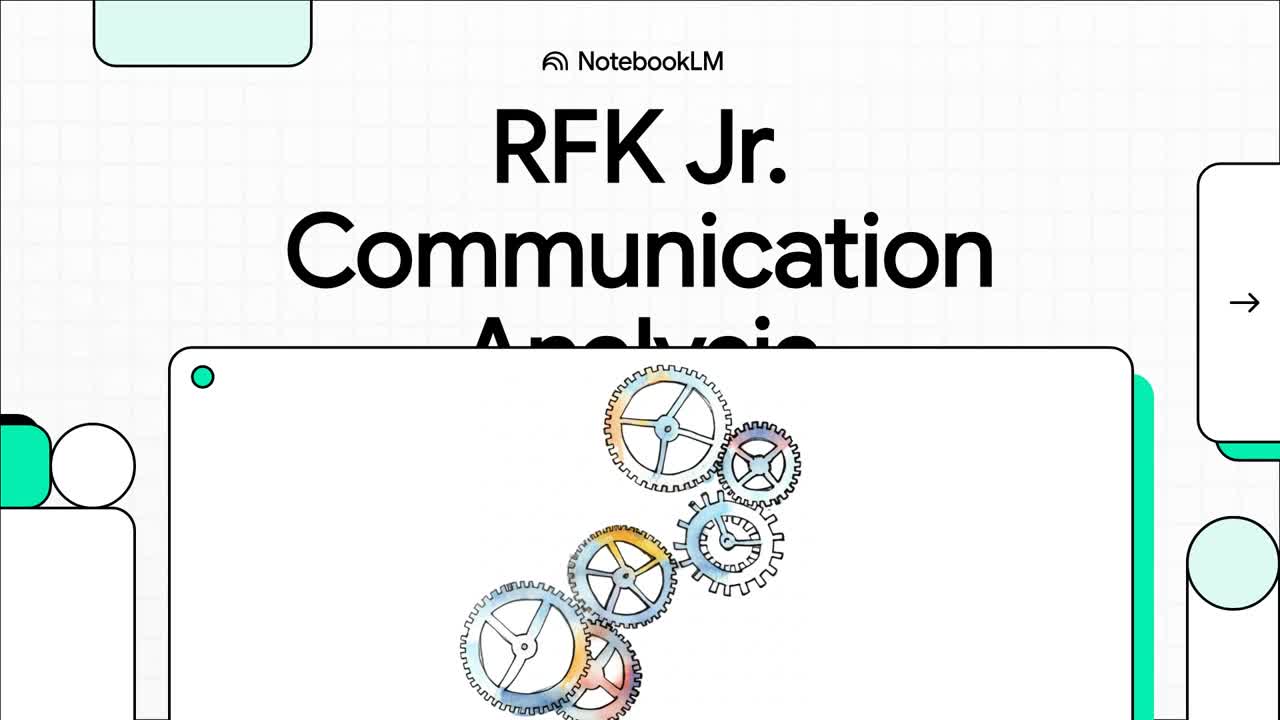Rhetoric and the Paradox of Public Health
Analyze Robert F. Kennedy Jr.'s (RFK Jr.) political communication, particularly his Senate testimony regarding the Centers for Disease Control and Prevention (CDC), chronic disease, and vaccine safety. His rhetoric reveals a consistent distrust of institutions and a tendency to frame vaccines as harmful while selectively supporting deregulated pharmaceuticals. Drawing parallels with historical instances of government vilification and using Gordon Allport's framework on prejudice, the analysis suggests RFK Jr.'s approach is ideological, leveraging fear and simplification to potentially justify defunding or dismantling public health agencies, and that his anti-vaccine stance has measurably contributed to public health harm. The paradox of his positions on regulation and his opposition to a single-payer healthcare system highlights inconsistencies in his proposed solutions for chronic illness in his Make America Healthy Again (MAHA) report.
Glossary of Key Terms
- ACIP (Advisory Committee on Immunization Practices): A committee within the CDC that provides advice and guidance on vaccine use to the public and healthcare providers.
- Allport's "Nature of Prejudice": A psychological framework by Gordon Allport that describes how prejudice often stems from fear, mistrust, and rigid thinking, simplifying complex issues through scapegoating, resistance to counterevidence, and identity formation.
- Anti-vaccine movement: A social movement that promotes misinformation and skepticism about the safety and efficacy of vaccines, often leading to vaccine hesitancy and decreased vaccination rates.
- Chronic Disease: Long-lasting health conditions (e.g., heart disease, diabetes, cancer) that are not typically cured but managed over time. They are often multifactorial, stemming from diet, environment, genetics, and socioeconomic factors.
- Cognitive Dissonance: The mental discomfort experienced by a person who holds two or more contradictory beliefs, ideas, or values, or is confronted by new information that conflicts with existing beliefs.
- Corporatocracy / Regulatory Capture: A situation where a regulatory agency, created to act in the public interest, instead advances the commercial or political concerns of special interest groups that dominate the industry or sector it is charged with regulating.
- Deflection: A rhetorical tactic used to avoid answering a direct question or addressing a specific issue by shifting focus to a different topic.
- Deregulation: The process of reducing or eliminating government regulations, often with the aim of promoting economic growth or reducing burdens on businesses.
- Distraction Matrix: A conceptual tool used to analyze how high-drama narratives can draw public attention away from other significant, often less sensational, policy issues.
- Dualism: A concept that divides the world or a given phenomenon into two fundamental and opposing parts, such as good versus evil or purity versus corruption.
- Economies of Scale: The cost advantages that enterprises obtain due to their scale of operation, with cost per unit of output decreasing with increasing scale. In health insurance, this can mean larger pools reducing risk and allowing better price negotiation.
- FDA (Food and Drug Administration): A federal agency responsible for protecting public health by ensuring the safety, efficacy, and security of human and veterinary drugs, biological products (including vaccines), medical devices, and the safety of the nation's food supply.
- Gaslighting: A manipulative tactic where a person or group makes someone question their own sanity, perception of reality, or memories. In rhetoric, it can involve reframing discussions to make critics seem unreasonable or misinformed.
- Ideology of Mistrust: A worldview built on the fundamental distrust of established institutions, authorities, and mainstream narratives, often leading to skepticism towards scientific consensus and official information.
- Motivated Reasoning: A cognitive bias where an individual's emotional biases or pre-existing beliefs influence how they interpret evidence or evaluate arguments, often leading them to accept information that supports their beliefs and reject information that contradicts them.
- Multifactorial: Referring to a condition or disease that is caused by a combination of multiple genetic and environmental factors.
- NIH (National Institutes of Health): A part of the U.S. Department of Health and Human Services, and the nation’s medical research agency, supporting scientific studies that improve health and save lives.
- Paradox: A seemingly self-contradictory statement or proposition that when investigated or explained may prove to be well-founded or true. In RFK Jr.'s case, it refers to his selective mistrust.
- Purdue Pharma / OxyContin: The pharmaceutical company and its opioid painkiller, which became central to the opioid crisis due to aggressive and misleading marketing practices that downplayed addiction risks.
- Quasi-Religious Undertones: Language or framing that, while not explicitly religious, draws on themes, structures, or emotional appeals commonly found in religious discourse (e.g., good vs. evil, purity, prophecy, martyrdom).
- Rhetorical Deflection: The act of redirecting an argument or conversation away from its original point, often to avoid uncomfortable truths or to control the narrative.
- Scapegoating: Blaming an individual or group for problems that are not their fault, often as a way to simplify complex issues or divert blame.
- Selective Mistrust: A pattern of distrusting certain institutions, products, or information (e.g., vaccines) while simultaneously trusting or promoting others (e.g., deregulated drugs, certain "alternative" health claims) without consistent evidence-based reasoning.
- Single-Payer System: A healthcare system in which a single public agency organizes healthcare financing, but the delivery of care remains largely in private hands.
- Title X: A federal grant program established in 1970 that provides comprehensive family planning and preventive reproductive health services, prioritizing low-income and uninsured individuals.
- VAERS (Vaccine Adverse Event Reporting System): A national passive reporting system co-managed by the CDC and FDA that collects reports from healthcare professionals and the public on possible side effects after vaccination.
- Villainization Strategy: A political communication tactic where an opponent, institution, or concept is portrayed as evil, corrupt, or fundamentally flawed to undermine its legitimacy or justify its dismantling.
- WHO (World Health Organization): A specialized agency of the United Nations responsible for international public health.
